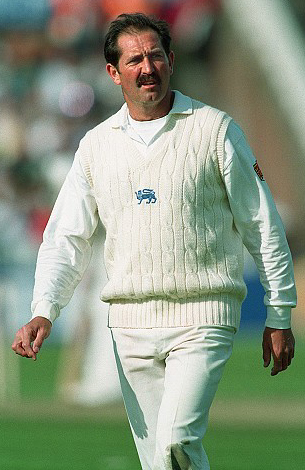
A TOOL OF THE POLITICIANS?
CRICKET’S BOYCOTT OF SOUTH AFRICA
As the world reels in the light of the latest in a long series of civil disturbances in South Africa, cricket like many other sports has become the “tool of the politician”.
Let it be said at the outset that any form of deprivation of human rights is to be totally rejected without precedent. If such a denial is on the grounds of colour it is a despicable system and should be spurned by any democratic thinking individual in the Western world. But is the current unrest in South Africa connected in any form to sport, and in particular cricket?
While most self-respecting people will totally reject apartheid, few can prove by isolating that nation from the world sports arena, we are in any way closer to altering their political system. Is the sportsman to be used as a “tool of the politician” in an attempt to pressurise for political reform in South Africa? That would seem to be the policy accepted by many countries albeit at the instigation of leading Black nations of the world. However, by refusing sporting links are we constructively moving any closer to changing that system and why is a similar system not adopted against other nations who practice their own form of deprivation of human rights? It does seem hypocrisy to maintain sporting links with Russia when the communist system allows little consideration for human rights but yet Russia is not part of the sporting boycott policy.
DOUBLE STANDARDS
Sports people throughout the modern world are divided on this controversial issue. Some have defied both government and ruling sports bodies to exercise a democratic right to play where, when and against whom they choose. The “Boycott South Africa” lobby champion the cause of democracy, yet apply double-standards by seeking to ban all sports people who wish to exercise a democratic right to freedom of choice. Politicians are inflexible. Governments in the modern world often ignore some appalling internal situations to join the anti-South African brigade. Black nations totally dominate the “boycott South Africa” movement and nowhere is that more evident than in world cricket. The powerful West Indies delegation head this lobby and cricket administrators from the Caribbean are now the “tools of the politicians” back home. The TCCB has succumbed to the Black nations fearing disruption of World cricket rather than take a stand. This abdication of responsibility has led to the current boycott of South Africa from world cricket and subsequent penalties for any cricketer daring to visit that country. By taking such action, do these cricket officials really think they are going to alter the apartheid system? Surely the sportsperson who travels to a foreign country to play his chosen sport, does so to bridge the political, religious and racial divides without any form of recognition or tacit acceptance of the prevailing policies within that particular nation? No self-respecting sportsperson condones apartheid, so the choice of whether or not one should visit South Africa, should be personal and not mandatory as it now is in cricket terms.
 DOUBLE STANDARDS PREVAIL
DOUBLE STANDARDS PREVAIL
The treatment of Graham Gooch, John Embury, Peter Willey and Co. was an appalling example of double standards in a growing catalogue of capitulation to Black Cricketing demands. The word blackmail must be accepted in its literal text but it has a new dimension in this controversial argument. As the top English cricketers played out a three-year ban, their contemporaries in the Test team included at least two South Africans! It was total and irrevocable hypocrisy!
Quite often the players are not as obstinate as their political masters. Indeed many black players play alongside South Africans in the English County Championship. Once back in their native land however, that democratic freedom is taken from their grasp. They can only play teams accepted by their governments. This is particularly evident in the West Indies, with some islands refusing to accept teams that include players with South African links. It would appear to matter little if the players are criminals, communists, fascists, dictators or any other unlikely adversary, it is just South African links that rule supreme in the league of sporting hypocrisy.
Attempts to ruin the Olympics by similar tactics have proved futile. Although disrupted, the Games have gone ahead without the participation of some of the leading nations in world athletics. Cricket may need to take a similar positive stand to safeguard its future or face total submission to the politicians. It is no secret that many nations who would appear to publicly boycott South Africa in sport, continue to keep strong trading links. It has become obvious to all, that sport is the tool of the Politician and the pressure groups who campaign throughout the world.








